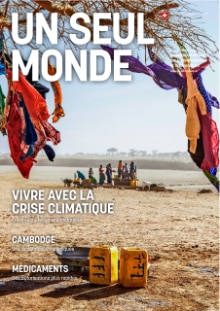- Home
- FDFA
- Publications
- All publications
Search and filter
Publications: 529
-

Un seul monde 3/2021
The sharp increase in climate shocks is threatening the lives of millions of people in the Global South. While these countries contributed least to global warming they are already bearing the biggest brunt. Project examples demonstrate how humanitarian aid and development cooperation can operate in conjunction to assist the most vulnerable in adapting to the new climate reality.
-

Swiss Development Assistance: statistics 2019
This publication consists of six tables providing an overview of public development assistance (Swiss Confederation, cantons, communes) and private grants (NGOs) from Switzerland in 2019, by recipient country and by organization. It also includes a list of the main projects by country.
-

Swiss Peace Supporter 2/2021
The SPS 2/2021 is devoted to the further development of military peace support and how the latter is adapting to future requirements. It also discusses the efforts to integrate women into the militia army after their deployment abroad. This edition’s Special also looks at promoting human rights standards for private security companies. Finally, a colleague reports on his daily life in Myanmar.
-

Guidelines on Human Rights 2021−24
These guidelines serve to implement the Foreign Policy Strategy 2020–23 in the field of human rights. They are situated at the third level of the cascade of key foreign policy documents . The guidelines are primarily directed at the FDFA and Switzerland’s external network, but can also provide guidance for other departments and actors. A glossary of key terms is also included in the document.
-

General Guidance on the Private Sector in the context of the International Cooperation Strategy 2021–24
A dynamic private sector is a key driver for reducing global poverty and it is a contributor to innovation, employment and livelihood improvement. Mobilizing private sector resources is also an essential complement to official development assistance in order to achieve the SDGs. ‘The General Guidance’ provides an orientation on the various forms of cooperation between the SDC and private sector actors and explains the engagement of SDC towards conducive economic policy frameworks. The General Guidance was drafted by the SDC in the course of 2020 and consulted with selected actors from the federal administration, the private sector and the civil society and is fully aligned with the 2030 Agenda for Sustainable Development of the UN.
-

Un seul monde 2/2021
Ten years into the conflict in Syria, the humanitarian situation in the country has gone from bad to worse. While the need for help is growing, international assistance is under mounting pressure. Lack of funding and barriers to access are jeopardising support to several million people.
-

China Strategy 2021-2024
This report was approved by the Federal Council on 19 March 2021. It is a geographical follow-up strategy to the Foreign Policy Strategy 2020–23 (FPS 2020–23) . In accordance with objective 6.4 of the FPS 2020–23, Switzerland has updated its China Strategy and is setting up interdepartmental coordinating bodies to improve coherence. The report also responds to the postulate of the National Council Foreign Affairs Committee FAC-N (20.4334 ) and the Nidegger motion (20.3738).
-

Swiss Peace Supporter 1/2021
The disarmament, demobilization and reintegration (DDR) of former combatants after armed conflicts is an essential part of the peace process. In this issue of SPS, Swiss experts share their experiences of DDR in Colombia, Mozambique and the Democratic Republic of the Congo. See also the special report on police missions.
-

Strategy for communication abroad 2021-24
The present Strategy for Communication Abroad 2021–24, which was approved by the Federal Council on 18 December 2020, is a thematic follow-up strategy to the Foreign Policy Strategy 2020–23. According to Article 3 of the Ordinance on the Cultivation of Switzerland’s Image Abroad (SR 194.11), the Federal Council adopts a Strategy for Communication Abroad for a period of four years at a time.
-

Analysis & Policy: Programme Framework 2021–24
How will the SDC's global IC instruments be applied in 2021–24? This information is set out in the Programme frameworks 2021–24 for the global programmes on climate change and environment, food security, health and water, and the Analysis and Policy and Global Institutions divisions.
-

Global Institutions: Programme Framework 2021–24
How will the SDC's global IC instruments be applied in 2021–24? This information is set out in the Programme frameworks 2021–24 for the global programmes on climate change and environment, food security, health and water, and the Analysis and Policy and Global Institutions divisions.
-

Global Programme Climate Change and Environment: Programme Framework 2021–24
How will the SDC's global IC instruments be applied in 2021–24? This information is set out in the Programme frameworks 2021–24 for the global programmes on climate change and environment, food security, health and water, and the Analysis and Policy and Global Institutions divisions.
Last update 26.01.2022
